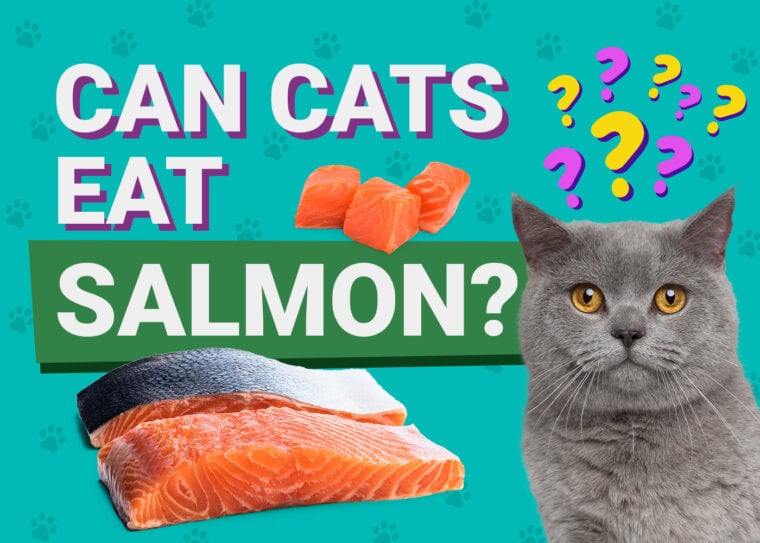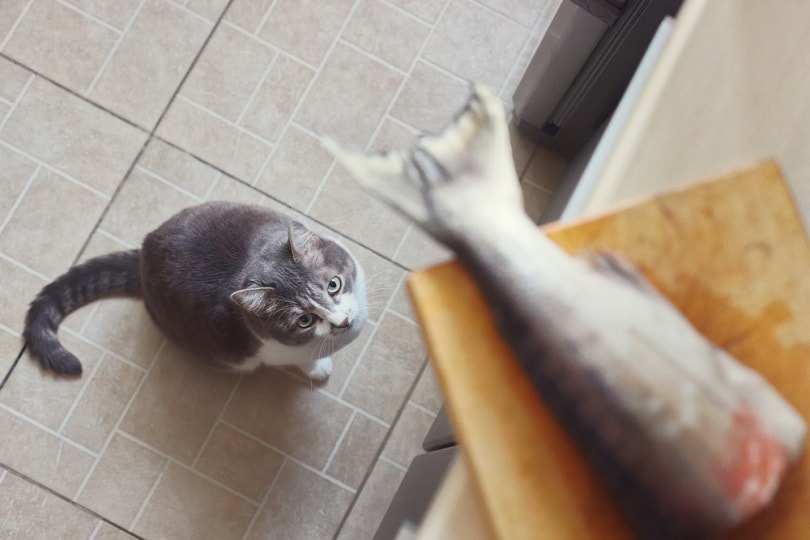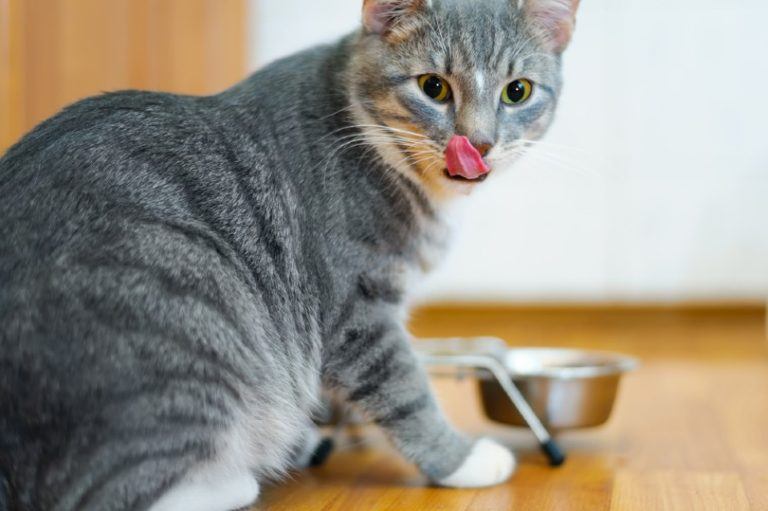
Salmon is a high-quality protein source for cats so cats can eat salmon. It is also high in omega fatty acids, which are essential for your cat’s skin and coat. It isn’t odd to find salmon listed as the main ingredient in cat food or even suggested by your vet due to the health benefits.
However, your cat thrives most off of a varied diet that contains many different meat sources. While salmon is a high-quality option, your cat cannot live eating salmon alone. Some cats may benefit from salmon food more than others.
Can Cats Eat Raw Salmon?

While salmon is an excellent option for felines, cats should never be given raw fish. Fish is commonly contaminated with food-borne pathogens that can make your cat sick. While many cats may be able to fight off these pathogens, it just takes one infection for your cat to become seriously ill.
Furthermore, they can pass on the infection to other cats and people through their feces. Since you’re likely scooping out their litter box, you’ll probably come into contact with the pathogen more likely than not.
There are also enzymes in raw fish that can destroy vitamin B1, which your cat needs in their diet. Consuming raw fish may block this vitamin your cat needs to thrive.
Can Cats Eat Canned Salmon?
Some canned salmon is okay for cats. However, many canned salmon brands contain added sodium and oils to help preserve the fish. While fat is an important nutrient for cats, salmon is already considered a fatty fish, so extra oils will represent way too many calories for your cat’s daily requirements. Therefore, it is essential to read the label before purchasing any canned salmon—or you can skip on the canned salmon altogether.
Can Cats Eat Smoked Salmon?
Smoked salmon is often cured with salt, so we recommend avoiding feeding it to your cat in excessive quantities. Instead, use only a small piece as an occasional treat.
Can Cats Eat Salmon Skin?
It isn’t that salmon skin is bad for them, but it can be a choking hazard in some cases. Salmon skin is an excellent source of omega-3 fatty acids. To avoid any issues, make sure you only feed salmon skin to your cat if it is baked and cut into small, bite-size pieces.

Is Salmon Good for Cats?
Salmon can be beneficial for cats in the right amounts. You don’t want to give your feline too much salmon, as it doesn’t contain the complete amino acid profile and protein balance that your cat needs. It can be a very nutritious part of their overall diet, though.
Salmon is very high in omega-3 fatty acids, which have a range of benefits. This type of fatty acid helps protect your feline from skin and coat problems. It may also support your cat’s immune system and brain health.
Salmon is also a source of vitamins and minerals such as potassium, selenium, and B vitamins. Your cat needs all of these micronutrients to thrive, and salmon contains plenty of them.

What About Mercury?
There is some controversy overfeeding your cat a food that contains mostly fish. After all, fish is relatively high in mercury. This wasn’t always the case, but it does seem that fish have slowly become more mercury-ridden since the Industrial Revolution. It is likely a matter of pollution, not the way fish have evolved.
If your cat eats fish, they will consume some of this mercury. The mercury content of fish is not all the same, though. All fish receive some mercury from their environment. However, predatory fish that eat other fish are usually more mercury-rich than fish lower on the food chain. This is because they are also getting mercury in their diet. Therefore, fish that eat plants are much lower in mercury than those that eat other fish. Salmon happens to be lower on the food chain. They also don’t spend their whole lifespan in the ocean, so they are quite low in mercury.
Other Possible Problems With Salmon
There are some other possible issues with salmon as well. Not all the proposed issues have scientific backing, though.
Some claim that salmon is high in potassium and phosphorus, which can cause kidney problems. However, there likely isn’t enough to bother most cats. You only really need to worry if your cat has a history of kidney or urinary tract problems. We didn’t find any scientific evidence to link a primarily fish diet with urinary problems.
Some cats may be allergic to fish, just like they may be allergic to any other type of protein. However, this isn’t necessarily a reason to avoid fish. Cat food allergies usually take the form of skin irritation or small fluid-filled lumps. If you notice these signs in your feline, you can talk to your vet about switching their food protein source. Unfortunately, you can’t avoid all risks of allergies when feeding your feline. The most common food allergens for cats are beef, fish, and chicken.
Vitamin K synthesis may be a problem for felines that consume a diet of mostly fish. Studies have found that kittens and nursing cats may become deficient if fed a commercial diet containing mostly fish. However, most diets contain added vitamin K. One study suggests that fish-based cat foods should be supplemented with at least 60 μg of vitamin K per each kilogram of food. Many cat food companies do this today, so check the label before purchasing anything.
For some reason, a diet high in fish has been linked to hyperthyroidism in cats. Other flavors have as well, including liver and giblet.
Some cats prefer fish a little too much. They may refuse to eat anything else and demand only their favorite fish-flavored food instead. Generally, we do recommend switching out your cat’s food often, as felines typically do best when they are regularly given a wide variety of different foods. Switching out foods can be difficult if your cat refuses to eat anything that isn’t salmon.
You should always measure your cat’s food, not just allow free feeding. This is especially true for salmon, as many felines may consume too much. It’s just that tasty. We generally recommend feeding your cat twice a day and keeping track of their weight, body condition score, and general health to ensure they’re getting just the right amount of food.
Knowing exactly what your feline companion can and cannot eat will help you become the best pet parent. Recognizing that not all cat bowls are equal is also key! The Hepper NomNom Cat Bowl sets itself apart from traditional options by catering to the specific needs of cats. The innovative design offers whisker relief via shallow dishes and promotes digestion with a slight bowl elevation. Find out if the Hepper NomNom is right for your cat by clicking here.
At Pet Keen, we’ve admired Hepper for many years and decided to take a controlling ownership interest so that we could benefit from the outstanding designs of this cool cat company!
Summary
Salmon is a high-quality protein option for cats. It includes high levels of omega fatty acids, which can help with everything from skin and coat health to brain development. Fish oil is often included in most cat foods for this reason. Omega fatty acids are just that important for cats.
With that said, salmon can cause a few problems. For instance, it isn’t suitable for cats with kidney disease as it may be a bit too high in potassium. Some cats are allergic to salmon and therefore shouldn’t consume it.
Cats have a tendency to like salmon a lot. This may be useful if you’re having a hard time encouraging your feline to eat. However, it can also cause your cat to eat a little too much, so we generally recommend carefully measuring out your cat’s food to avoid obesity.
Featured image credit: rjunqueira, Pixabay









